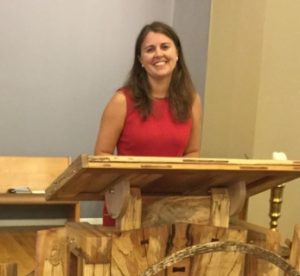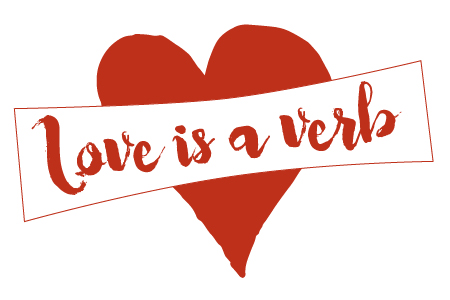 Ruth Harder is the pastor at Rainbow Mennonite Church in Kansas City, Kansas. Prior to Rainbow, she was the associate pastor at Bethel College Mennonite in North Newton, Kansas, and before that she was a hospital chaplain as well as the communications coordinator and youth director at LaSalle Street Church, a multi-denominational church in Chicago, Illinois. Ruth grew up in Hillsboro, Kansas, and is a graduate of Bethel College (’01) and Anabaptist Mennonite Biblical Seminary (’07). Ruth is married to Jesse Graber, a free-lance illustrator. You will find at least one of them cheering on the Kansas City Royals come April.
Ruth Harder is the pastor at Rainbow Mennonite Church in Kansas City, Kansas. Prior to Rainbow, she was the associate pastor at Bethel College Mennonite in North Newton, Kansas, and before that she was a hospital chaplain as well as the communications coordinator and youth director at LaSalle Street Church, a multi-denominational church in Chicago, Illinois. Ruth grew up in Hillsboro, Kansas, and is a graduate of Bethel College (’01) and Anabaptist Mennonite Biblical Seminary (’07). Ruth is married to Jesse Graber, a free-lance illustrator. You will find at least one of them cheering on the Kansas City Royals come April.
“The beginning of love is to let those we love be perfectly themselves, and not to twist them to fit our own image. Otherwise we love only the reflection of ourselves we see in them.”–Thomas Merton
Currently I’m meeting with five couples as they prepare for a life together in marriage. Every couple is different and I do my best to listen deeply to their stories and the unique gifts, traumas, hopes and burdens that they carry into the relationship. Better said, I do my best to help them listen deeply to each other.
I often start our pre-marital counseling sessions with Thomas Merton’s words of invitation and warning.
To be fully known and loved by another person, at least to the extent that is possible, is a beautiful gift.
And yet on the way to loving another person fully, we sometimes get off track. We are tempted to twist people into our own image or we try to twist our relationships to fit a certain image. We stop listening deeply to one another and subsequently, love twists into a question mark, or worse, a past tense, distant reality.
I do my best to encourage couples to keep a spirit of curiosity alive in their relationship and to keep asking questions of themselves and each other.
And I hope for them what I hope for myself and for the church more broadly:That on our way to loving each other well we will stay alert to the ways we sometimes unavoidably twist people into our own image, rather than getting to know them on their own terms.
By the way, we do this with our notions of God too, as Anne Lamott so helpfully reminds: “You can safely assume you’ve created God in your own image when it turns out that God hates all the same people you do.”
you’ve created God in your own image when it turns out that God hates all the same people you do.”
I ask a lot of questions to the couples I meet with. But even asking questions feels risky and has potential to hurt people, especially since so many of the questions we ask reveal our assumptions. For example, I am often asked, “When are you planning to have children?” Can you see the assumptions embedded in this so-called question?
I have learned over the years, and often the hard way, that sometimes we can hurt people by the very questions we ask. Curiosity itself can be voyeuristic and selfish. I believe there is an art to getting to know one another in truly loving ways. So as I sit across from couples, I try to give great care to the questions I ask.
I try to stay aware of the fact that my stories, experiences and assumptions may or may not match with theirs.
I’m certain that I often fail. Assuming couples keep coming to me for pre-marital counseling, I will be given more opportunities to learn the art of asking questions in a way that permits couples to reveal something of who they are, if not with me, with their partner.
Here are just a few of the questions I ask, which I think are for everyone, whether married or not:
- What are the major life events/traumas/celebrations/achievements that have shaped who you are?
- What were you taught about marriage and relationships growing up?
- What were you taught about race growing up?
- What messages did you internalize about race that made you feel superior and/or inferior?
- What did it mean to be a boy/girl/child in your family?
- How did your parents or caregivers talk to you about sexuality?
- If you have had violent or abusive experiences, how and with whom have you processed them? How and when have you felt re-victimized?
I believe it would be a gift if all of us in the church spent time considering the questions we ask. And it would be even a greater gift if we learned to listen deeply to people’s responses, going beyond just what we want or think we hear.
And it might be the greatest gift of all if we came into greater awareness of whose great image we are all made and held.


